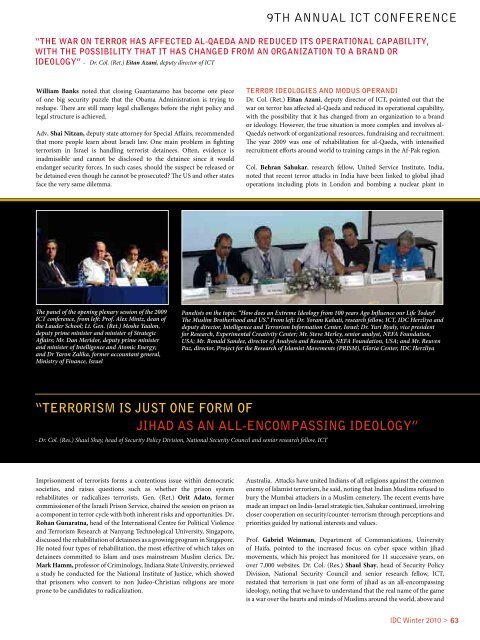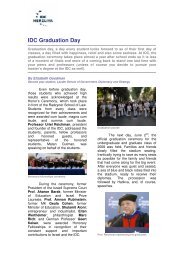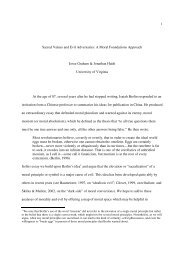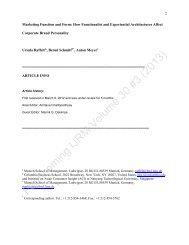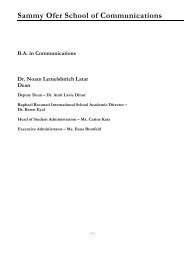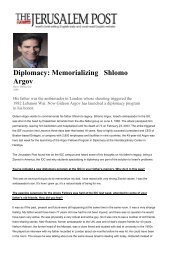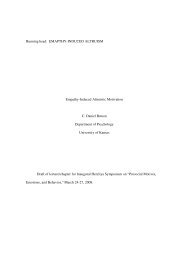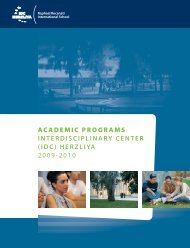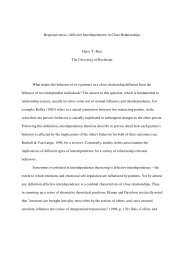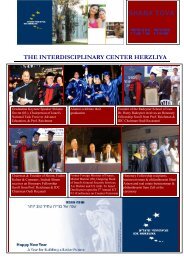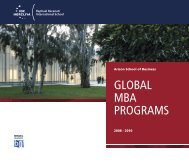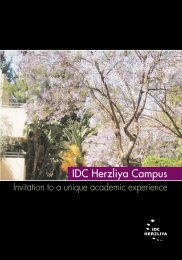The IDC
The IDC
The IDC
Create successful ePaper yourself
Turn your PDF publications into a flip-book with our unique Google optimized e-Paper software.
“THE WAR ON TERROR HAS AFFECTED AL-QAEDA AND REDUCED ITS OPERATIONAL CAPABILITY,<br />
WITH THE POSSIBILITY THAT IT HAS CHANGED FROM AN ORGANIZATION TO A BRAND OR<br />
IDEOLOGY” - Dr. Col. (Ret.) Eitan Azani, deputy director of ICT<br />
William Banks noted that closing Guantanamo has become one piece<br />
of one big security puzzle that the Obama Administration is trying to<br />
reshape. <strong>The</strong>re are still many legal challenges before the right policy and<br />
legal structure is achieved.<br />
Adv. Shai Nitzan, deputy state attorney for Special Affairs, recommended<br />
that more people learn about Israeli law. One main problem in fighting<br />
terrorism in Israel is handling terrorist detainees. Often, evidence is<br />
inadmissible and cannot be disclosed to the detainee since it would<br />
endanger security forces. In such cases, should the suspect be released or<br />
be detained even though he cannot be prosecuted? <strong>The</strong> US and other states<br />
face the very same dilemma.<br />
<strong>The</strong> panel of the opening plenary session of the 2009<br />
ICT conference, from left: Prof. Alex Mintz, dean of<br />
the Lauder School; Lt. Gen. (Ret.) Moshe Yaalon,<br />
deputy prime minister and minister of Strategic<br />
Affairs; Mr. Dan Meridor, deputy prime minister<br />
and minister of Intelligence and Atomic Energy;<br />
and Dr Yaron Zalika, former accountant general,<br />
Ministry of Finance, Israel<br />
Imprisonment of terrorists forms a contentious issue within democratic<br />
societies, and raises questions such as whether the prison system<br />
rehabilitates or radicalizes terrorists. Gen. (Ret.) Orit Adato, former<br />
commissioner of the Israeli Prison Service, chaired the session on prison as<br />
a component in terror cycle with both inherent risks and opportunities. Dr.<br />
Rohan Gunaratna, head of the International Centre for Political Violence<br />
and Terrorism Research at Nanyang Technological University, Singapore,<br />
discussed the rehabilitation of detainees as a growing program in Singapore.<br />
He noted four types of rehabilitation, the most effective of which takes on<br />
detainees committed to Islam and uses mainstream Muslim clerics. Dr.<br />
Mark Hamm, professor of Criminology, Indiana State University, reviewed<br />
a study he conducted for the National Institute of Justice, which showed<br />
that prisoners who convert to non Judeo-Christian religions are more<br />
prone to be candidates to radicalization.<br />
9th AnnuAl ict cOnference<br />
TERROR IDEOLOGIES AND MODUS OPERANDI<br />
Dr. Col. (Ret.) Eitan Azani, deputy director of ICT, pointed out that the<br />
war on terror has affected al-Qaeda and reduced its operational capability,<br />
with the possibility that it has changed from an organization to a brand<br />
or ideology. However, the true situation is more complex and involves al-<br />
Qaeda’s network of organizational resources, fundraising and recruitment.<br />
<strong>The</strong> year 2009 was one of rehabilitation for al-Qaeda, with intensified<br />
recruitment efforts around world to training camps in the Af-Pak region.<br />
Col. Behran Sahukar, research fellow, United Service Institute, India,<br />
noted that recent terror attacks in India have been linked to global jihad<br />
operations including plots in London and bombing a nuclear plant in<br />
Panelists on the topic: “How does an Extreme Ideology from 100 years Ago Influence our Life Today?<br />
<strong>The</strong> Muslim Brotherhood and US.” From left: Dr. Yoram Kahati, research fellow, ICT, <strong>IDC</strong> Herzliya and<br />
deputy director, Intelligence and Terrorism Information Center, Israel; Dr. Yuri Byaly, vice president<br />
for Research, Experimental Creativity Center; Mr. Steve Merley, senior analyst, NEFA Foundation,<br />
USA; Mr. Ronald Sandee, director of Analysis and Research, NEFA Foundation, USA; and Mr. Reuven<br />
Paz, director, Project for the Research of Islamist Movements (PRISM), Gloria Center, <strong>IDC</strong> Herzliya<br />
“TERRORISM IS JUST ONE FORM OF<br />
JIHAD AS AN ALL-ENCOMPASSING IDEOLOGY”<br />
- Dr. Col. (Res.) Shaul Shay, head of Security Policy Division, National Security Council and senior research fellow, ICT<br />
Australia. Attacks have united Indians of all religions against the common<br />
enemy of Islamist terrorism, he said, noting that Indian Muslims refused to<br />
bury the Mumbai attackers in a Muslim cemetery. <strong>The</strong> recent events have<br />
made an impact on India-Israel strategic ties, Sahukar continued, involving<br />
closer cooperation on security/counter-terrorism through perceptions and<br />
priorities guided by national interests and values.<br />
Prof. Gabriel Weinman, Department of Communications, University<br />
of Haifa, pointed to the increased focus on cyber space within jihad<br />
movements, which his project has monitored for 11 successive years, on<br />
over 7,000 websites. Dr. Col. (Res.) Shaul Shay, head of Security Policy<br />
Division, National Security Council and senior research fellow, ICT,<br />
restated that terrorism is just one form of jihad as an all-encompassing<br />
ideology, noting that we have to understand that the real name of the game<br />
is a war over the hearts and minds of Muslims around the world, above and<br />
<strong>IDC</strong> Winter 2010 > 63


